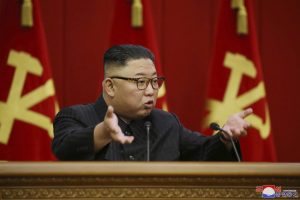In a letter addressed to the 10th Congress of the Youth League held in late April, Kim Jong Un wrote of building “a powerful and prosperous socialist country in which all the people enjoy happiness” in the coming 15 or so years. This was the first time Kim had spoken of a medium-term plan longer than the typical five-year version.
If North Korea is going to achieve the kind of economic growth in which “all the people enjoy happiness,” it will first have to seriously negotiate denuclearization with the United States. Absent any breakthrough in U.S.-North Korea relations, there is little prospect of any lifting of economic sanctions.
Talk of 15 years suggests that Kim Jong Un, now in his 10th year since taking power, is looking to stay for the long term. Kim has been North Korea’s leader longer than Xi Jinping has been president of China, and yet he is still just 37 years old. Fifteen years from now, there will have been at least three presidential elections in the United States. As such, while Kim certainly does need a breakthrough with the U.S., he very likely doesn’t feel he needs to make significant concessions to the Biden administration. Even if former President Donald J. Trump does not win election again in 2024, it is entirely possible that another U.S. leader with a penchant for grand deal making may emerge. In the meantime, North Korea’s military power will grow ever strong, giving Kim more cards to hold.
Given that, if we want any insights into the prospects of denuclearization on the Korean peninsula, we need to begin with what is happening with Kim’s own regime.
In his closing address at the Conference of Cell Secretaries of the Workers’ Party of Korea in late April, Kim mentioned the word “communism” six times. His recent claim that North Korea aims to become a “communist utopia” is a notable change in rhetoric.
During the Cold War, the Eastern Bloc worked to establish socialism as a way-station along the road to a communist society. North Korea was no exception, and many farm villages declared the slogan “rice is communism” during the Kim Il Sung era. The argument was that supplying the people with sufficient rice was the way to accomplish a communist utopia that would be the envy of capitalist societies, where the law of the jungle ruled. Following the unprecedented economic crisis in the 1990s, however, the slogan changed to “rice is socialism.” The Kim Jong Il regime began to believe that realizing “communism” would be difficult, so they stopped highlighting that word.
The word “communism” was deleted entirely from the constitution in April 2009 and then from the party’s rules in September 2010. The portraits of Marx and Lenin on display at Kim Il Sung Square were removed in April 2012 when Kim Jong Un officially took over. Today, there are only the smiling portraits of Kim Il Sung and Kim Jong Il.
“Communism” likely made its return to the party rules revised at the 8th Congress of the Workers’ Party of Korea in January this year, but the usage of the term may have changed. Phrases like “communist morals” and “communist good manners and customs” have been used frequently in recent times, and if we closely examine the contexts, it is clear that they are calls to create an ordered society in which everyone should discard their self-interest and unite in spirit around Kim Jong Un. The slogan “one for all and all for one” has also suddenly started appearing with much greater regularity. With an economy hard hit by the COVID-19 pandemic on top of many years of sanctions, North Korea needs a more robust grip over popular sentiment.
The “theory of a socio-political organism (in North Korea)” that Kim Jong Il advocated in the 1980s has also made a comeback. People are given life by their parents, but the life of the revolutionary, or political life, is bestowed by the leader. The former is limited while the latter is more important, as the leader can grant eternal life. It thus goes without saying that the logic is that you owe your loyalty to your leader, before even to your biological parents. Meanwhile, starting this year, Kim Jong Un has started calling himself “Suryeong” (Supreme Leader), just as Kim Il Sung and Kim Jong Il did.
There have also been calls to revive the spirit of the “Chollima Movement,” which Kim Il Sung advocated in 1956. This is a movement for increased production that is likened to a legendary horse (Chollima) that can run a thousand miles in a day, a symbol of the North Korean economy outperforming South Korea’s. Recently, Korean Central Television even broadcast a special program on the occasion of the 60th anniversary of the building of the Chollima Statute.
It will be worth watching to see if these concepts take hold going forward. (One might recall here that the Kim Jong Il administration declaring that it would “open the gate to a thriving nation in 2012” and then make no further reference to this as that year approached.)
One likely aim of the Kim Jong Un administration’s revival of so many slogans from decades past is to restore the glory of the Kim Il Sung era, when North Korea did in fact for a time outstrip South Korea in economic development.
But at the same time, it underscores the regime’s inability to come up with anything new, forcing it to revive old policy.
What does that mean for North Korea and U.S. relations? Pyongyang recognizes that economic sanctions are here to stay, and so it is trying to go it alone. As it does so, it will wait patiently for the day Washington is prepared to make concessions.
































